循環(huán)制造即將變成現(xiàn)實(shí):蘋(píng)果計(jì)劃拆解舊iPhone,,用于生產(chǎn)新品
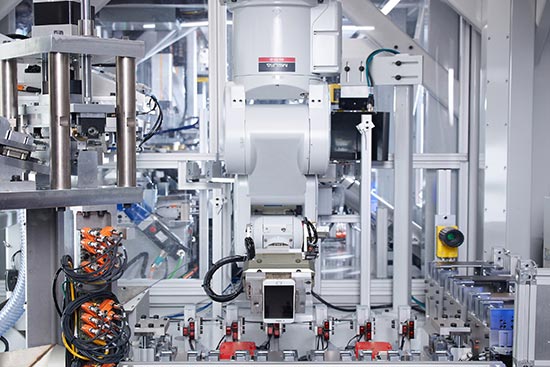
|
在奧斯汀的一個(gè)工業(yè)園區(qū)里,藏著一棟沒(méi)有任何標(biāo)志的建筑,,你甚至在蘋(píng)果地圖上都找不到這個(gè)地方,。然而在這里,蘋(píng)果公司的一個(gè)采用了最新技術(shù)的機(jī)器人正在熱火朝天地工作著,。只見(jiàn)在一個(gè)玻璃罩子里,,幾條自動(dòng)機(jī)械臂正在圍著一條傳送帶快速而精準(zhǔn)地上下左右揮舞著。玻璃罩內(nèi)的溫度可低至零下112度,,機(jī)械臂在這種極低溫度下作業(yè),,使它的周邊升起了一團(tuán)霧氣。幾名穿著藍(lán)色實(shí)驗(yàn)服,、頭戴護(hù)目鏡的技術(shù)人員在旁邊觀察著機(jī)械臂的工作情況,。除了機(jī)器運(yùn)轉(zhuǎn)時(shí)發(fā)出的低沉的嗡嗡聲,還不時(shí)傳來(lái)機(jī)械敲擊的砰砰聲,。 這套復(fù)雜的系統(tǒng)名叫Daisy,,它結(jié)合了人力指令和自動(dòng)技術(shù),給蘋(píng)果帶來(lái)了它一直孜孜以求的結(jié)果——從報(bào)廢的iPhone上拆解塑料,、金屬和玻璃,,用于二次利用,。蘋(píng)果的環(huán)境政策和社會(huì)事務(wù)副總裁麗莎·杰克遜表示:“我們?cè)诠こ躺匣撕芏鄷r(shí)間,,以確保我們的設(shè)備能夠運(yùn)轉(zhuǎn)起來(lái)。研發(fā)Daisy的目的,,就是確保我們可以有一種有效且高效的方法來(lái)拆解產(chǎn)品,。” |
In an unmarked building tucked away in an industrial park in Austin, a location so secret it doesn’t appear on Apple Maps, one of Apple’s latest technologies is hard at work. Inside glass casing, automatic robotic arms move left, right, up, down, and around a conveyor belt with speed and precision. A couple of technicians in blue lab coats, safety goggles, and gloves watch as fog—created by the glassed-in chamber’s extreme cold, which can drop to –112 degrees—billows around one of the arms. Loud mechanical pounding breaks the low hum of running machinery with a uniform thump, thump, thump. This complicated system, called Daisy, combines automation and a human touch to give Apple its coveted result: scraps of pure plastic, metal, and glass from otherwise-unusable iPhones. “We spend a lot of time in the engineering, making sure our devices stay together,” says Lisa Jackson, Apple’s vice president of environment, policy, and social initiatives. “Daisy was about making sure we had an efficient and effective way to ?disassemble products.” |
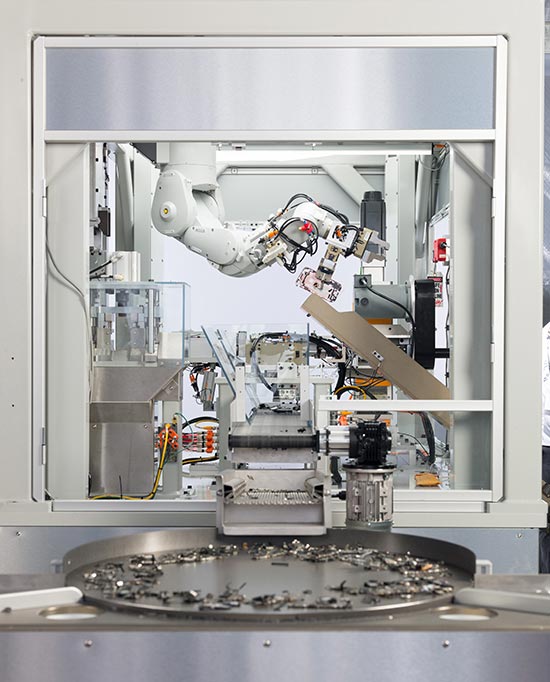
|
作為一個(gè)能夠?qū)㈦娮釉O(shè)備拆解到極致的機(jī)器人,Daisy不僅代表了電子產(chǎn)品回收領(lǐng)域內(nèi)的一個(gè)突破,,同時(shí)也描繪出了蘋(píng)果在盡力縮小環(huán)境影響上的路線圖,。蘋(píng)果對(duì)自己在環(huán)保領(lǐng)域里的成績(jī)還是頗為自得的。現(xiàn)在,,它的供應(yīng)鏈中有相當(dāng)一部分比例使用的是可再生能源?,F(xiàn)在,它又把注意力轉(zhuǎn)向了一個(gè)同樣棘手的問(wèn)題——數(shù)量越來(lái)越龐大而且有毒有害的廢棄電子設(shè)備零件,。 蘋(píng)果在2017年曾經(jīng)宣稱,,公司的終極目標(biāo),是要使用可回收或可再生材料制造它的全部產(chǎn)品——而且是只使用可回收和可再生材料,。不過(guò)至于什么時(shí)候能實(shí)現(xiàn)這個(gè)目標(biāo),,蘋(píng)果并未給出時(shí)間表,。(顯然不會(huì)很快實(shí)現(xiàn)。)不過(guò)這棟建筑,,也就是今年4月剛剛投入使用的蘋(píng)果材料回收實(shí)驗(yàn)室,,就是蘋(píng)果開(kāi)展相關(guān)實(shí)驗(yàn)的地方。蘋(píng)果將從這里起步,,一步步朝它的終極目標(biāo)邁進(jìn),。 |
Daisy represents not only a breakthrough in electronic recycling efforts—robotically pulling apart an electronic device piece by piece—but also a road map to minimizing environmental impact. Apple prides itself on its green credentials; a high proportion of its supply chain, for example, is powered by renewable energy. Now it’s turning its attention to an equally thorny problem: the fast-growing, often toxic detritus of discarded electronic gear. Apple in 2017 announced a goal of eventually making all of its products from recycled or renewable material—and eventually, only such material. Apple can’t say when that will happen. (It won’t be soon.) But this building, the Material Recovery Lab, which opened in April, is where the company is doing the research that it hopes will get it there. |
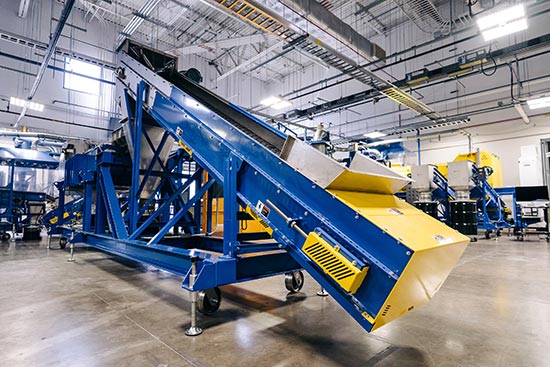
|
電子垃圾涵蓋的范圍很廣,,除了報(bào)廢的手機(jī),還有傳真機(jī)和智能手表等等,。如今,,電子垃圾管理已經(jīng)成為了一個(gè)越來(lái)越復(fù)雜的問(wèn)題。來(lái)自于全球電子垃圾監(jiān)測(cè)機(jī)構(gòu)的數(shù)據(jù)顯示,,2016年,,全球共產(chǎn)生了4400萬(wàn)噸電子垃圾,足夠蓋起4500個(gè)埃菲爾鐵塔,。 包括消費(fèi)電子產(chǎn)品在內(nèi)的家用電子垃圾,,只是電子垃圾總數(shù)的一小部分。來(lái)自于羅徹斯特理工學(xué)院戈利薩諾可持續(xù)發(fā)展研究所的數(shù)據(jù)顯示,,去年全球的家用電子垃圾總量約為160萬(wàn)噸(約合35億磅),。戈利薩諾可持續(xù)發(fā)展研究所的副教授卡利·巴比特認(rèn)為,隨著各大科技公司相繼推出更小,、更精致的電子產(chǎn)品,,電子垃圾的總量實(shí)際上是在減少的,但同時(shí)新的問(wèn)題也在出現(xiàn),。她表示:“我們現(xiàn)在使用的電子產(chǎn)品,,依賴于越來(lái)越復(fù)雜的稀土材料和貴金屬的混合?!倍S著企業(yè)推出新產(chǎn)品的速度越來(lái)越快,,就算有了自動(dòng)化的拆解回收系統(tǒng),也難以跟上人們丟棄電子垃圾的速度,。 |
Managing e-waste, a category that spans thrown-away equipment from fax machines to smartwatches, is becoming an increasingly complex problem. In 2016 the world generated 44 million metric tons of e-waste, according to the Global E-Waste Monitor. For perspective, that’s the equivalent of about 4,500 Eiffel Towers. Household e-waste, including consumer electronics, is a smaller share of the pile; last year it accounted for 1.6 million metric tons, or 3.5 billion pounds, according to the Golisano Institute for Sustainability at Rochester Institute of Technology. Total e-waste mass is actually decreasing as companies release sleeker, smaller products, says Callie Babbitt, associate professor at the Golisano Institute. But there’s a new problem on the rise, she explains: “The products we’re using now are relying on an increasingly complex mix of rare-earth materials and precious metals.” And as companies put out new products at an increasingly rapid pace, even automated systems may struggle to keep up. |
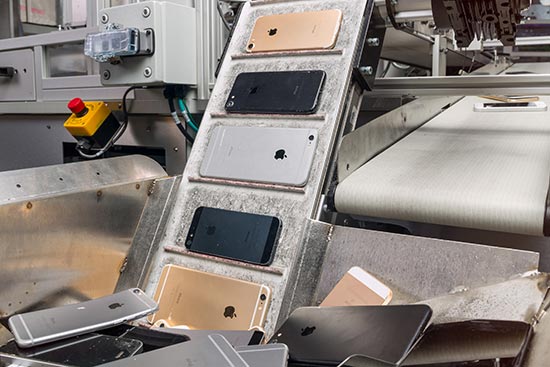
|
蘋(píng)果公司拒絕估計(jì)自己造成的電子垃圾總量,。去年蘋(píng)果一共賣出了2.177億部iPhone手機(jī),,按平均一部手機(jī)5盎司的重量估算,這意味著光是通過(guò)手機(jī),,蘋(píng)果就向全球消費(fèi)者輸送了大約6800萬(wàn)磅的物料,。如果消費(fèi)者沒(méi)有更好的回收或者處理方案,,很多iPhone最終必然會(huì)成為電子垃圾。 杰克遜表示,,Daisy代表著蘋(píng)果公司朝著它的環(huán)保目標(biāo)邁出了“關(guān)鍵的一步”,。在加盟蘋(píng)果前,她曾經(jīng)擔(dān)任美國(guó)環(huán)保署署長(zhǎng)一職達(dá)五年之久,。Daisy于去年正式問(wèn)世,,它可以拆解iPhone 5以上的15款不同型號(hào)的iPhone手機(jī),每小時(shí)可拆解200臺(tái),。今年4月以來(lái),,蘋(píng)果通過(guò)“以舊換新”計(jì)劃,已經(jīng)回收了大約900萬(wàn)臺(tái)iPhone手機(jī),。蘋(píng)果的兩臺(tái)Daisy機(jī)器人(另一臺(tái)在荷蘭)正在拆解回收其中的100萬(wàn)臺(tái)舊手機(jī),。 |
Apple declines to estimate the size of its own e-waste footprint. The company sold 217.7 million iPhones last year: At an average of about five ounces a phone, that means Apple put about 68 million pounds of materials into households worldwide through phones alone, some of which will eventually become waste if consumers lack a better option. Daisy represents a “crucial step” toward Apple’s goals, says Jackson, who spent five years leading the U.S. Environmental Protection Agency before joining Apple. The robot, which debuted last year, can disassemble 15 different iPhone models (from the iPhone 5 up) at a rate of 200 devices per hour. The machine at the Austin lab and another in the Netherlands together are processing about 1 million of the 9 million iPhones collected since April through Apple’s trade-in program. (Most of the others are refurbished and resold.) |
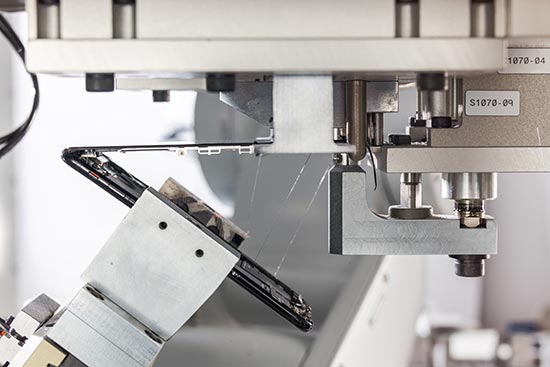
|
蘋(píng)果公司表示,,公司希望最終對(duì)產(chǎn)品中使用的14種材料做到完全回收,。其中之一是塑料,因?yàn)樗枰獢?shù)百年的時(shí)間才能夠分解,,因而會(huì)對(duì)野生動(dòng)物構(gòu)成威脅,,而且它在降解的過(guò)程中還會(huì)釋放出有害的毒素。另一種材料是鋰,,主要使用在可充電電池中,,鋰礦的開(kāi)采會(huì)對(duì)環(huán)境造成嚴(yán)重破壞。在Daisy的幫助下,,蘋(píng)果公司已經(jīng)能夠?qū)θ?4種材料進(jìn)行回收利用,。目前,它已經(jīng)開(kāi)始在MacBook Air等新產(chǎn)品中使用回收的錫和鋁等材料,。 傳統(tǒng)的電子垃圾回收設(shè)施并沒(méi)有Daisy這么考究。大多數(shù)工廠主要依賴于笨重的機(jī)器將報(bào)廢產(chǎn)品粉碎,,然后將碎片一股腦地倒進(jìn)一個(gè)容器里,。這些混合物更加難以回收,而且有些零部件會(huì)在這個(gè)過(guò)程中丟失或者損毀,。杰克遜表示,,蘋(píng)果不僅希望改進(jìn)自己的回收流程,還希望改進(jìn)全行業(yè)的回收方式,。在蘋(píng)果在奧斯汀的回收設(shè)施中,,有一部分也致力于一般電子垃圾回收技術(shù)的研發(fā),從而通過(guò)技術(shù)創(chuàng)新,,使所有回收設(shè)施都能夠回收更多的材料,,改進(jìn)消費(fèi)科技的供應(yīng)鏈,。 |
Apple lists 14 materials used in its products that it hopes to eventually fully recycle. One is plastic, which takes hundreds of years to decompose, poses a threat to wildlife, and can release harmful toxins as it corrodes. Another is lithium, found in rechargeable batteries, the mining of which takes a heavy toll on the environment. With help from Daisy, the company has been able to recover all 14 elements for recycling; it’s already reusing tin and aluminum for new Apple products like the MacBook Air. Traditional e-waste recycling facilities are less dainty than Daisy. Most rely on bulky machines to shred products, dumping the output into bins of mixed particles. These mixed streams are much harder to recycle, and some elements get lost, stuck, or tossed out in the process. Jackson says Apple wants to improve not only its own processes but also the broader industry’s mulch-it-all approach. Part of its Austin facility is dedicated to broad ?e-waste recycling R&D, with the hope of developing innovations that will allow all recycling facilities to recover more materials, improving the consumer-tech supply chain. |
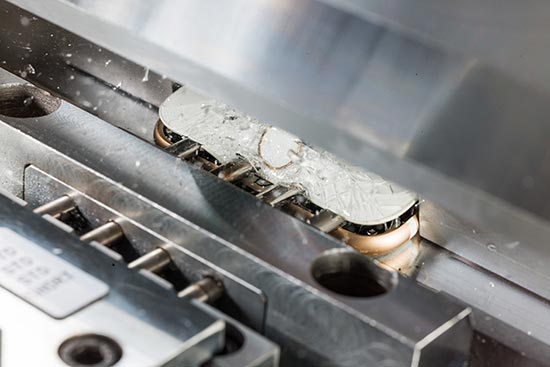
|
蘋(píng)果的回收目標(biāo)要想得以實(shí)現(xiàn),,必然還有一條很長(zhǎng)的路要走,,同時(shí)也需要行業(yè)各方的共同努力。杰克遜也表示,,就連她自己,,一開(kāi)始也不相信全面回收是可行的。但在與工程師和其他團(tuán)隊(duì)成員交流后,,她發(fā)現(xiàn)全面回收不僅是可行的,,而且是極為必要的。她表示:“如果我們不花時(shí)間去做投資,,確保硬件可以長(zhǎng)期使用,,材料可以再次利用,我們就會(huì)面臨一個(gè)始終無(wú)法克服的難題,?!保ㄘ?cái)富中文網(wǎng)) 本文另一版本登載于《財(cái)富》雜志2019年9月刊,標(biāo)題為《未來(lái),,你的新手機(jī)將由舊手機(jī)制成》,。 譯者:樸成奎 |
It’s a long road that will require numerous parts of the industry to get on board if Apple’s goals are to be realized. Even Jackson says she wasn’t initially convinced it was doable. But after talking to engineers and team members, she came to see total recycling as not only possible but also vitally necessary. “If we don’t spend time investing in making sure the hardware is used for a long time and materials are reused,” she says, “it will be a problem we cannot surmount.” A version of this article appears as part of the Change the World package in the September 2019 issue of Fortune with the headline “Someday, Your New Phone Could Be Made From Your Old Phone.” |













